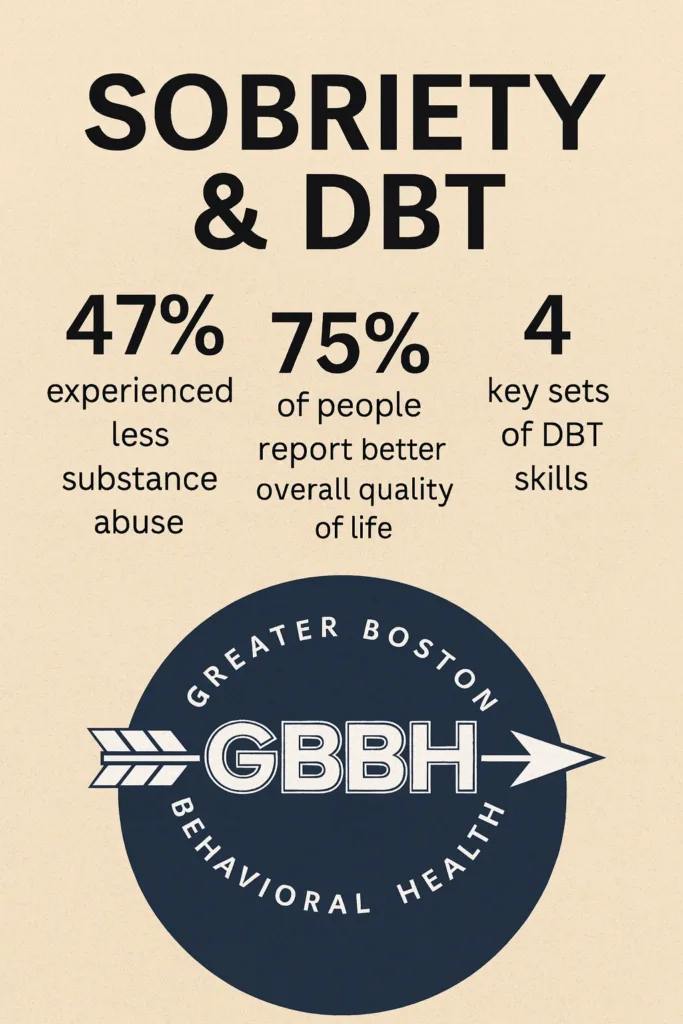There’s a particular kind of ache that doesn’t get talked about much in recovery circles—the fear that sobriety will make you boring. That your spark, your voice, your edge will disappear. For many, the idea of giving up substances isn’t just about detoxing their body—it’s about mourning who they think they’ll stop being.
If this hits close to home, you’re not alone. At Greater Boston Behavioral Health, we work with people every day who are wildly creative, deeply emotional, socially magnetic—and terrified that getting sober will make them “less.”
Here’s the truth: sobriety doesn’t mean playing small. And with the help of Dialectical Behavior Therapy (DBT), you can actually build a bigger, more emotionally honest life than you’ve ever known.
You’re Not Broken for Wanting to Keep Parts of Your Old Self
Let’s name something: the parts of you that liked the way substances made you feel? That felt more connected, more expressive, more alive? Those weren’t wrong. They weren’t weak. They were parts of a system doing its best with what it had.
Substances often give us fast access to connection and release. If you’re creative, sensitive, or intense—you probably learned to use that edge to create, perform, feel, or survive. Giving that up can feel like giving up your language.
DBT helps you learn a new language. One that honors emotion, sharpens your intuition, and lets you stay present in your body—even when it’s hard.
DBT Helps You Hold Intensity Without Falling Apart
Think of DBT as an emotional scaffolding system. When your inner world feels too big, too fast, or too painful, DBT gives you the structure to stay steady.
You don’t have to become emotionally “flat” to get stable. In fact, DBT values emotional nuance. It’s built for people who feel a lot. The goal isn’t to suppress that—it’s to work with it.
Through DBT, you’ll learn:
- Mindfulness: Staying grounded in the moment, even when your brain wants to run
- Distress tolerance: Surviving emotional overwhelm without defaulting to self-destructive habits
- Emotion regulation: Understanding what your feelings are trying to tell you—and choosing how to respond
- Interpersonal effectiveness: Navigating relationships with clarity and self-respect, not fear or impulsivity
These aren’t buzzwords. They’re tools that help you stay intact in moments that used to undo you.
Emotional Depth Doesn’t Come From Chaos
There’s a myth many of us carry—especially creatives and feelers—that we need to be in pain to make something beautiful. Or that being volatile makes us real.
But over time, chaos becomes a cage. What started as self-expression turns into survival mode. You might still be writing songs, painting, connecting—but it’s harder. Less joyful. More punishing.
Sobriety doesn’t kill the art. It creates space for more of it. When you’re not constantly recovering from the crash, you have more energy to create from clarity—not crisis.
DBT Can Help You Redefine What Power Feels Like
Playing small isn’t about living quietly. It’s about being ruled by fear—of rejection, of emotional collapse, of your own mind. Sobriety supported by DBT helps you reclaim agency.
Instead of asking, “Can I handle this moment?” you start asking, “What do I want to do with this moment?”
That shift might sound subtle. But for someone whose life has been shaped by reacting instead of choosing—it’s seismic.
You Don’t Need to Be “Fixed.” You Need to Be Seen.
One of the most powerful things about DBT is that it doesn’t treat you like a problem to be solved. It treats you like a person with emotions that make sense in context.
You don’t have to explain away your fear of losing yourself. You get to explore it—with honesty, curiosity, and support.
That’s what we do here at Greater Boston Behavioral Health. We work with clients who are ready to stop numbing but aren’t ready to abandon their identity. And we help them realize—those two things aren’t in conflict.
You Can Still Be the Life of the Party—Even If the Party Changes
Sobriety isn’t about withdrawing from joy. It’s about finding versions of joy that don’t leave you hollow the next day.
We’ve seen clients learn to dance again without liquid courage. To perform on stage with nerves and pride. To go on dates without needing to pre-game confidence. To cry in front of people and call it progress, not weakness.
That’s not “playing small.” That’s showing up real—and letting people love you for it.
Ready to Build a Bigger Life?
If sobriety feels like the right next step—but you’re scared of what you might lose—you don’t have to face that fear alone. Our Dialectical Behavior Therapy program in Boston is built for people who want recovery that doesn’t erase them.
We’ll help you build skills to stay emotionally engaged, connected, and fully you—without relying on substances to get there. And for those in Needham, Dedham, Newton, or West Roxbury, we have nearby locations to make care accessible.
❓ FAQ: DBT, Sobriety, and Creative Identity
Does DBT make you suppress emotions?
No—quite the opposite. DBT helps you understand, name, and work with your emotions so they don’t control or overwhelm you. It’s about learning to respond instead of react.
Can I do DBT even if I don’t identify as an “addict”?
Absolutely. DBT is used for a wide range of mental health concerns, including emotional regulation, anxiety, depression, and identity struggles. You don’t need a label to benefit from this work.
Is DBT just talk therapy?
Not really. DBT combines traditional therapy with structured skills training. Many clients attend both individual sessions and group skills classes each week. It’s hands-on, practical, and deeply reflective.
What if I’m scared I’ll lose my creativity when I get sober?
That fear is common—and valid. But in our experience, creativity often expands with sobriety. DBT helps you access emotional truth without having to self-destruct to find it.
How long does DBT take to work?
Most people begin seeing shifts within the first couple months, especially as they start practicing DBT skills in real time. A full program typically runs 6–12 months, depending on your goals.
Can I start DBT if I’m still using sometimes?
We encourage honesty. While full commitment to sobriety helps maximize DBT’s impact, many clients start where they are—with ambivalence, with setbacks, with questions. If you’re willing to show up, we’re willing to meet you there.
Your Next Step Starts Here
You don’t have to trade your identity for your sobriety. With DBT, you can build a life that’s emotionally rich, creatively alive, and deeply yours.
Call (888) 450-3097 or visit Greater Boston Behavioral Health’s DBT program page to learn more about our services in Boston, Massachusetts.


